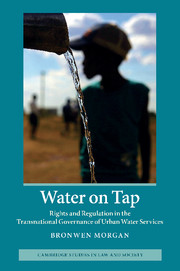Book contents
- Frontmatter
- Contents
- List of figures
- List of tables
- Acknowledgements
- Introduction: The field of global water policy: struggles over redistribution and recognition
- 1 Rights, regulation and disputing: a conflict-centred approach to transnational governance
- 2 Managed liberalisation and the dual face of French water services provision
- 3 ‘Another world is possible’: Bolivia and the emergence of a participatory public provision model for access to urban water services
- 4 Regulatory arbitrage and popcorn politics: contrasting disputing pathways in Argentina and Chile
- 5 Moonlight plumbers in comparative perspective: electoral v. constitutional politics of access to water in South Africa and New Zealand
- 6 Law's work: legality and identity in transnational spaces
- Epilogue
- References
- Index
- CAMBRIDGE STUDIES IN LAW AND SOCIETY
4 - Regulatory arbitrage and popcorn politics: contrasting disputing pathways in Argentina and Chile
Published online by Cambridge University Press: 03 May 2011
- Frontmatter
- Contents
- List of figures
- List of tables
- Acknowledgements
- Introduction: The field of global water policy: struggles over redistribution and recognition
- 1 Rights, regulation and disputing: a conflict-centred approach to transnational governance
- 2 Managed liberalisation and the dual face of French water services provision
- 3 ‘Another world is possible’: Bolivia and the emergence of a participatory public provision model for access to urban water services
- 4 Regulatory arbitrage and popcorn politics: contrasting disputing pathways in Argentina and Chile
- 5 Moonlight plumbers in comparative perspective: electoral v. constitutional politics of access to water in South Africa and New Zealand
- 6 Law's work: legality and identity in transnational spaces
- Epilogue
- References
- Index
- CAMBRIDGE STUDIES IN LAW AND SOCIETY
Summary
Introduction
In the 1990s transnational flows of money and investment, which as we saw in the last chapter were influential in Bolivia, created common trajectories of institutional change across many other countries too, particularly in Latin America. In global terms, Latin American countries experienced the greatest level of foreign involvement in water services in the 1990s, signing 106 of 223 cross-border water services contracts between 1990 and 2002 (ECLAC 2002; Kirkpatrick and Parker 2004). Suez, Vivendi and Thames all invested significantly in Chile and Argentina during this period. Suez, which as noted in Chapter 3 had held a long-term concession contract in La Paz, Bolivia, bought the regional water company providing water to Santiago, Chile, and secured long-term concessions in Argentina in Buenos Aires, Santa Fe and Córdoba. Thames bought three regional water companies in the south of Chile. Vivendi had a stake in the Buenos Aires concession and also secured a long-term concession in the province of Tucumán, Argentina. Disinvestment has since occurred in all the Argentinian concessions, and Thames Water has sold its Chilean holdings (Lobina and Hall 2007(a)), but the remaining Chilean acquisitions have remained in foreign hands.
This shared experience of transnational investment in cross-border markets for the delivery of water services generated pressures for the adoption of a managed liberalisation approach to governance. This resulted in the common adoption of semi-independent regulatory agencies in the water sector in many countries, many of which shared basic formal similarities.
- Type
- Chapter
- Information
- Water on TapRights and Regulation in the Transnational Governance of Urban Water Services, pp. 118 - 145Publisher: Cambridge University PressPrint publication year: 2011



